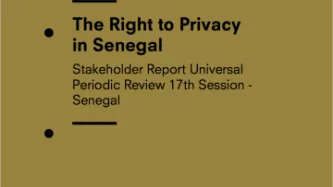Search
Content type: News & Analysis
In order to lawfully conduct communications surveillance (“lawful interception”) in the U.S. and Western Europe, a law enforcement agency must seek authorisation from a court and produce an order to a network operator or internet service provider, which is then obliged to intercept and then to deliver the requested information. In contrast, Russian Federal Security Service operatives (FSB) can conduct surveillance directly by utilising lawful interception equipment called SORM.
SORM
SORM is…
Content type: Advocacy
This stakeholder is a submission by Privacy International (PI) and Jonction Senegal. PI is a human rights organisation that works to advance and promote the right to privacy and fight surveillance around the world. Jonction Senegal is a human rights organisation based in Dakar, which aims to promote sustainable and equitable development and human rights both in Africa in general and in Senegal in particular. Together PI and Jonction Senegal wish to bring concerns about the protection and…
Content type: News & Analysis
The drive for accountability in aid spending has put humanitarian and development agencies under pressure to collect an ever-growing amount of data about those who receive their assistance. Donors also increasingly demand that new technologies are deployed to ensure aid reaches those it is targeted at; preventing people from fraudulently using refugees’ identities, for example, was a key motivation behind UNHCR’s recent introduction of biometric technology to register Syrian…
Content type: News & Analysis
Below is an excerpt of an article that recently appeared on Slate, written by our partner Kevin Donovon, a researcher at the University of Cape Town, and Carly Nyst, Head of International Advocacy at Privacy International:
"Move over, mobile phones. There’s a new technological fix for poverty: biometric identification. Speaking at the World Bank on April 24, Nandan Nilekani, director of India’s universal identification scheme, promised that the project will be “transformational.” It “uses…
Content type: Press release
Privacy International has called upon HM Revenue & Customs to investigate potentially illegal exports by the British company Gamma International, which has been exporting surveillance products without a license to repressive regimes with dismal human rights records.
On Friday 9th November, Privacy International's Eric King wrote to HMRC with a 186-page dossier of evidence against Gamma. HMRC is the body responsible for enforcing export regulations and policies set by the Department…
Content type: Press release
Privacy International, the European Center for Constitutional and Human Rights, the Bahrain Center for Human Rights, Bahrain Watch and Reporters without Borders filed formal complaints with the Organisation for Economic Cooperation and Development (OECD) in the UK and Germany against two surveillance companies on Friday 1st February. The British and German National Contact Points are being asked to investigate Gamma International and Trovicor respectively with regards to both companies’…
Content type: Long Read
On 1st February 2013 Privacy International, together with the European Centre for Constitutional and Human Rights (ECCHR), the Bahrain Center for Human Rights, Bahrain Watch and Reporters without Borders, filed complaints with the Organisation for Economic Cooperation and Development (OECD) against Gamma International, a company that exports “FinFisher” (or “FinSpy”) intrusive surveillance software, and Trovicor GmbH, a German company (formerly a business unit of Siemens) which also sells…
Content type: Long Read
On 1st February 2013, Privacy International, together with the European Centre for Constitutional and Human Rights (ECCHR), the Bahrain Center for Human Rights, Bahrain Watch and Reporters without Borders, filed complaints with the Organisation for Economic Cooperation and Development (OECD) against Gamma International, a company that exports “FinFisher” (or “FinSpy”) intrusive surveillance software, and Trovicor GmbH, a German company (formerly a business unit of Siemens) which also sells…
Content type: News & Analysis
On International Data Privacy Day, it is important that we all ask ourselves: who has access to our personal information? Who can find out where we’ve been and who we’ve called, who can read our emails and our text messages? Who can find which websites we access and which files we download?
Statistics released by Google and Twitter over the past week are a sobering reminder that it is not only the corporations to which we consensually provide this information which are able…
Content type: Press release
Google's latest Transparency Report, released at 3pm GMT this afternoon, shows that requests by European governments for the browsing history, email communications, documents and IP addresses of Google's users have skyrocketed since the Transparency Report was launched three years ago. Countries in the European Union made 7,254 requests about 9,240 users or accounts between July and December 2012, averaging over 1,200 requests a month. This represents over a third of all requests made by…
Content type: News & Analysis
The social news website MiroirSocial.com confirmed yesterday that the prominent French technology firm Bull SA has sold its controversial mass surveillance "Eagle" system to Stéphane Salies, one of its chief designers and an ex-director of Bull. The surveillance software was previously manufactured and supplied by Bull’s subsidiary, Amesys, a company that is currently the subject of a judicial enquiry in Paris following a legal complaint filed by two human rights organisations, the…
Content type: Press release
In his response to the third report from the Foreign Affairs Committee Session 2012-13, Foreign Secretary William Hague expressed for the first time the government's firm commitment to putting in place new export controls on "telecommunications equipment for which there is a reasonable expectation that it might be used to restrict freedom of expression on the internet". He added that the government was committed to "working with international partners through the mechanism of the Wassenaar…
Content type: News & Analysis
Court Of Appeal Tells UK Government That Criminal Records Bureau Checks System Breaches Human Rights
Yesterday the Court of Appeal delivered its judgment in the case of R (on the application of T) v Chief Constable of Greater Manchester & Others concerning the operation of the criminal records check system. The court was considering three cases that hinged on the same question: whether or not the blanket requirement on those applying for jobs involving contact with children and vulnerable adults (approximately four million people each year) to disclose all past convictions,…
Content type: News & Analysis
On November 12, the Russian Supreme Court okayed the wiretapping of an opposition activist. The Court ruled that spying on Maxim Petlin, a regional opposition leader in Yekaterinburg, was lawful, since he had taken part in rallies where calls against extending the powers of Russia’s security services were heard. The court decided that these were demands for “extremist actions” and approved surveillance carried out by the national interception system, known as SORM.
Manned by the…







